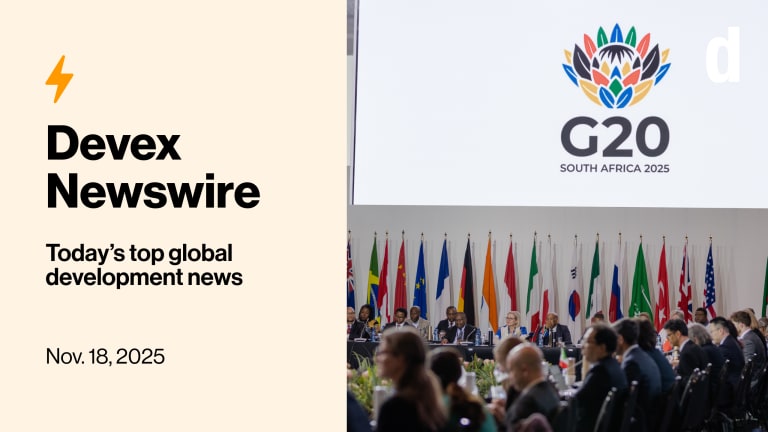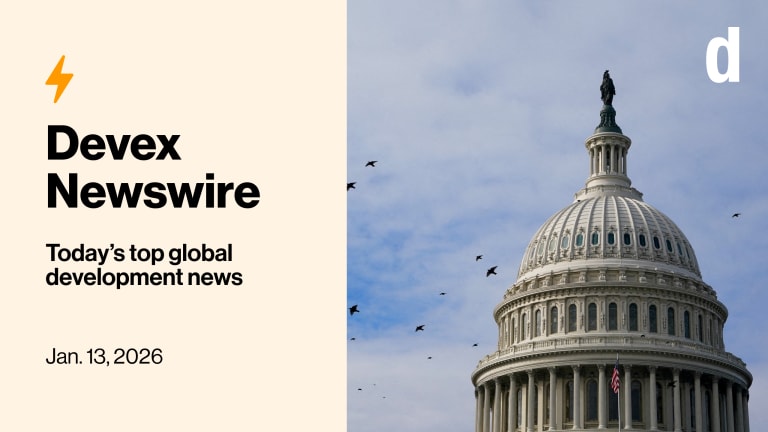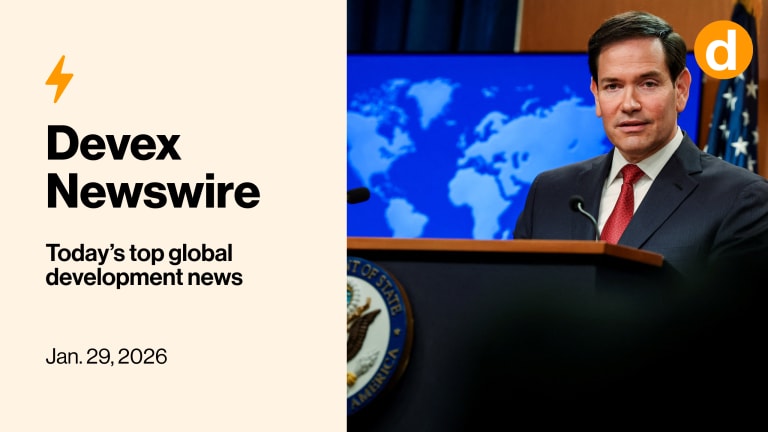
We talk a lot about localization because everyone swears up and down they’ll do it. But the evidence on whether those promises are kept is dismal — and a recent report puts this failure into sharp relief.
Also in today’s edition: A major farm bill inches forward in the U.S. Congress, Sudan is in the spotlight — sort of, and a new Africa club emerges.
+ How well did you keep up with our news coverage last month? Take this five-item quiz to test your knowledge!
Breadcrumbs for the global south
This is a preview of Newswire
Sign up to this newsletter for an inside look at the biggest stories in global development, in your inbox daily.
Less than one-tenth. That’s the measly amount of official development assistance funneled to civil society which actually goes toward organizations in the global south, according to a new report that analyzed a dozen donors from 2009 to 2021.
So where’s the rest of the money going? Almost 63% of funding went to donor countries’ own civil society organizations, while just under 29% flowed to civil society in other global north countries, leaving just over 8% for the global south. So basically, breadcrumbs.
The report, aptly named “Too Southern to be Funded,” was published by the #ShiftThePower movement, a coalition pushing for locally led development.
“For some reason, various governments think their own INGOs are best placed to deal with the challenges around the world, rather than the organizations in those communities,” says Dylan Mathews, the CEO of Peace Direct, an organization that backed the report. “Why do we still believe that?”
That’s a good question — one our sector grapples with every day. The report raised another thorny question: Does an international agency’s country office — which might be staffed with local employees — count as local?
For Mathews, the answer is an emphatic no.
“The power of the brand gives organizations privileged access, funding, contacts,” he tells my colleague Elissa Miolene. “They aren’t masters of their own destiny if they’re not the ones setting the agenda.”
So which donors are the stingiest when it comes to global south funding, and which are (relatively) generous? Check out Elissa’s story to find out.
Read: New report reveals limited funding for global south organizations (Pro)
Related reading: How localization will change INGOs (Pro)
+ A Devex Pro membership lets you get the most out of our localization coverage. It also gives you access to all our exclusive reporting and analyses, invite-only events, the Weekender newsletter covering globaldev’s top job moves, and more. Not yet gone Pro? Start your 15-day free trial today.
Betting the farm
There’s been some movement in the U.S. Congress on the long-stalled farm bill, with Republicans releasing an outline of their proposals, which the House Agriculture Committee will consider on May 23.
While much of the behemoth bill — think nearly $1 trillion — deals with domestic agricultural issues, it has tremendous consequences for U.S. food aid overseas.
The largest international aid program at stake is Food for Peace, which provides U.S.-grown commodities as both emergency and nonemergency food aid abroad, Devex contributor Rebecca Holland writes in her breakdown of the bill.
One area of debate involves proposed new restrictions that could force nonemergency programs to use more U.S. commodities — which aid groups say is unrealistic and expensive.
For example, buying food in foreign markets can be cheaper and delivered more easily. But Food for Peace requires that nonemergency aid be grown by American farmers and shipped on vessels registered in the U.S., which can increase shipping costs by as much as 25%.
Tying food aid overseas to domestic interests that benefit American farmers, however, is often the price aid groups must pay to ensure a decent tranche of funding.
And that money can’t come soon enough, with the world experiencing record hunger and cash-strapped aid groups forced to make wrenching decisions.
“There are terrible trade-offs: Which villages are going to get food, which do we think are going to hang on?” says Emily Byers of Save the Children. “There are going to be people who need support who are not going to get it. It’s devastating for us.”
Read: With US farm bill uncertain, aid groups try to protect Food for Peace
+ Check out our page dedicated to the future of U.S. aid.
An invisible crisis
While Congress has cleared some of the biggest legislative hurdles off its plate, including the supplemental for Ukraine, Israel, and Taiwan, it still has business to take care of. That includes one of the world’s most pressing humanitarian crises: Sudan.
It’s been just over a year since an internal power struggle erupted in the country, forcing 8 million people from their homes and edging 5 million toward famine, Elissa reports.
But the true toll is a mystery.
“We don’t have a credible death count. We literally don’t know how many people have died, possibly to a factor of 10 or 15,” Tom Perriello, the U.S. special envoy to Sudan, told a Senate hearing on Wednesday. “Because of telecom blackouts, and because of the rampant harassment, abuse, and detention of civil society actors, we have not always gotten a complete record.”
Lawmakers grilled Perriello — who was appointed to his current role at the end of February — with questions, from how the U.S. was preparing for an impending “full-scale assault” on the city of El Fasher by rebel forces, to how weapons were continuing to slip through Sudan’s borders despite an arms embargo.
Yet, despite the weighty questions, senators seemed distracted — perhaps symbolic of the world’s attitude toward Sudan. A conflicting conference call, U.S. Senator Cory Booker told the special envoy, was pulling lawmakers in and out of the hearing. At one point, there was just one lone lawmaker in the room while they spoke about how little attention the crisis was receiving.
Read: Sudan — Warnings of an invisible crisis on the brink of 'mass atrocity'
EBRD welcomes Benin
Country by country, the European Bank for Reconstruction and Development is expanding its remit, my colleague Rob Merrick reports.
In fact, it’s been one year since EBRD approved a “limited” move into sub-Saharan Africa — and now it has its first member country from the region.
Benin has become the London-based bank’s 75th shareholder. It will be eligible for finance and policy support once other EBRD shareholders approve the expansion.
It is a far cry from the bank’s birth in 1991 on a mission to reinvigorate Central and Eastern Europe after the collapse of the Soviet Union. It has already expanded to work in Central Asia, North Africa, and parts of the Middle East.
However, EBRD has described support for Ukraine as “the Bank’s highest priority, now and in the future.” A €4 billion capital increase was agreed last December to allow it to continue to pump €1.5 billion a year into the country — a sum it hopes to double to €3 billion when the war with Russia is over.
+ For more content like this, sign up to Devex Invested, a free, weekly newsletter bringing you the insider brief on business, finance, and the SDGs.
A new club
African countries aren’t waiting for Western institutions to bail them out. They’re taking matters — especially their debt burdens — into their own hands.
Hence the launch of the Alliance of African Multilateral Financial Institutions, or the Africa Club, which African Union leaders hope will be a vehicle to push for global financial architecture reforms.
Unlike the London and Paris clubs whose role is to help debtor countries, the Africa Club’s mandate is to “drive sustainable economic development and financial self-reliance.”
It starts off with a solid portfolio. The club holds assets of more than $53 billion, attracting equity investment of over $8.6 billion, primarily from African countries.
“Through this alliance, we are committed to leveraging Africa’s capital for its development while advocating for equitable treatment and fair representation for the continent,” Thierno-Habib Hann, CEO of Shelter Afrique Development Bank, tells Devex contributor Anthony Langat. “Together, we harness our collective strength to shape a more inclusive and sustainable financial landscape, ensuring Africa’s rightful place on the global stage.”
Read: Can a new Africa Union alliance hasten global financial reforms?
+ Listen: For the latest edition of our weekly podcast series, Devex’s Raj Kumar and Adva Saldinger sit down with Bidjan Nashat, managing director of Aequitas Human Capital, to discuss the Africa Club’s goals and other top global development stories from this week.
In other news
The Australian government has committed $492 million to the Asian Development Bank for projects in the Pacific, but wants the financial institution to change the way it operates in the region. [ABC News]
The U.S. announced Thursday it will provide nearly $55 million in humanitarian aid to Burkina Faso. [Reuters]
The United Nations Development Programme estimates that Gaza reconstruction will cost up to $50 billion due to massive destruction not seen since World War II. [Al Jazeera]
Sign up to Newswire for an inside look at the biggest stories in global development.








